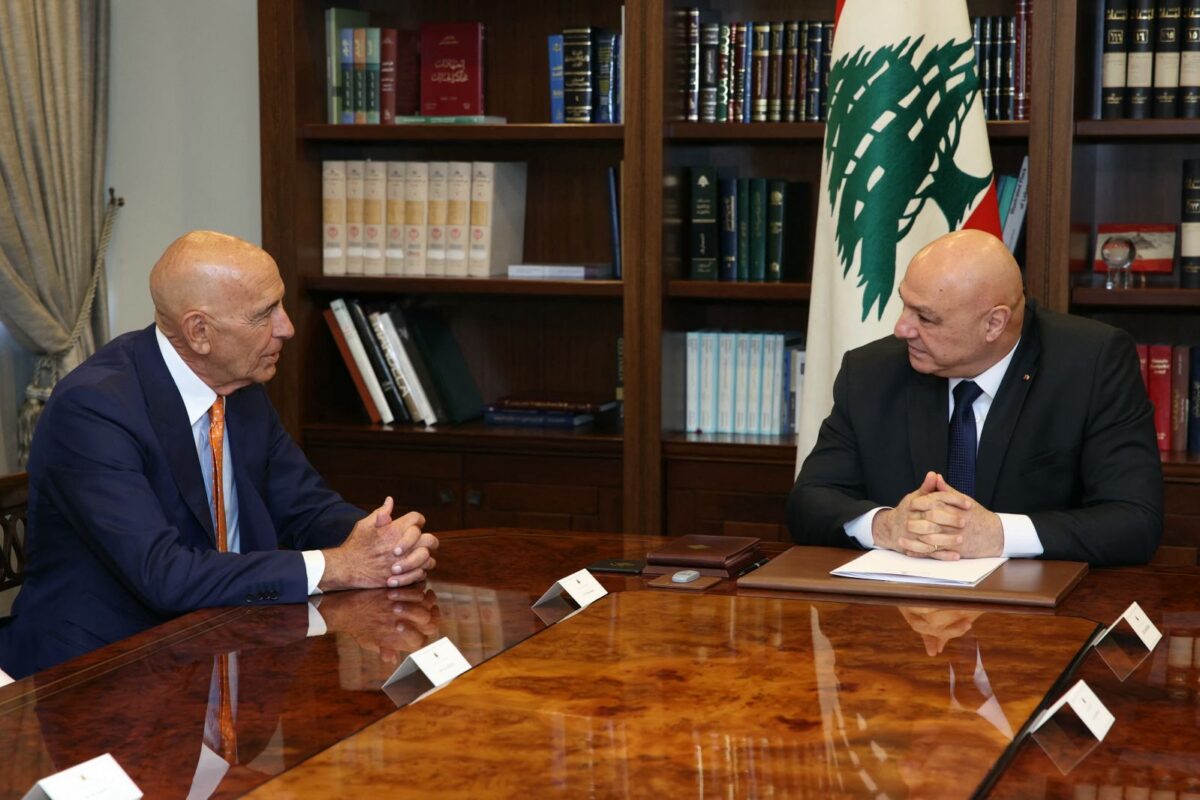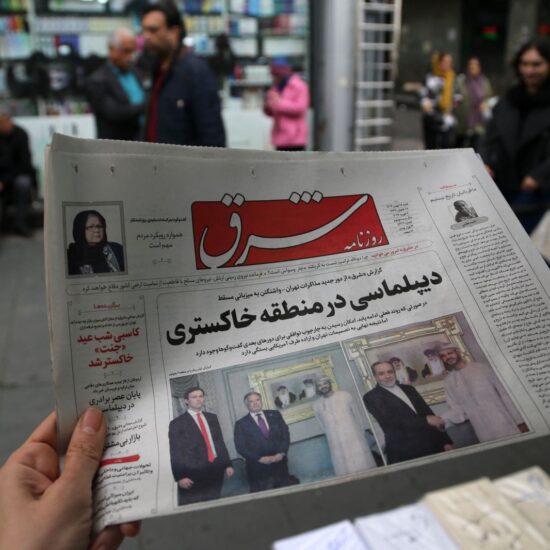
As the US envoy awaits Lebanon’s response, both the country and the wider region face mounting uncertainty amid ongoing political, security, and economic challenges.
As Lebanon braces for its official response to a U.S.-proposed paper, anticipation builds ahead of the second visit by U.S. envoy Tom Barrack. Speaking on Saturday, Barrack urged Lebanese leaders to seize what he described as a “historic moment” to implement critical reforms and pursue the disarmament of armed groups.
“This is Lebanon’s moment,” Barrack declared in a post on X. “The hope awakens! It’s time to rise above sectarian divisions and realize the promise of ‘One country, one people, one army.’”
The proposal has stirred significant debate, particularly among Hezbollah supporters, as tensions with Israel remain high. Speaking to a crowd of thousands gathered for Ashura in Beirut’s southern suburbs, Hezbollah’s deputy secretary-general, Naim Qassem, rejected any suggestion of disarmament while Israeli attacks continue.
“We cannot be asked to soften our stance or lay down our arms while [Israeli] aggression continues,” Qassem said, underlining the group’s refusal to back down until Israel halts its air raids and withdraws from southern Lebanon.
Ashura, a solemn and symbolic occasion for Shia Muslims, marks the 680 AD martyrdom of Imam Hussein, the Prophet Muhammad’s grandson, in the Battle of Karbala. It has long stood as a day of resistance against oppression. On Sunday, the streets of Beirut’s southern suburbs were draped in yellow Hezbollah flags, and chants of defiance echoed as Qassem delivered his speech beneath a portrait of former leader Hassan Nasrallah, killed in an Israeli strike last September.
In Lebanon:
Hezbollah Revising: Reuters reported that Hezbollah is undergoing a major internal review following last year’s war with Israel, considering reducing its military role without fully disarming. Sources say ongoing discussions reflect mounting pressure from Israeli strikes, U.S. disarmament demands, financial strain, and diminished regional support after the fall of Syria’s Bashar al-Assad and Iran’s weakened position. Insiders say Hezbollah now sees its large arsenal as a liability, prompting internal debates about its future role and strategy.
More Strikes: Israeli warplanes launched multiple airstrikes across northern, eastern, and southern Lebanon late Sunday, violating the ceasefire, according to Lebanon’s state-run National News Agency (NNA). Targets included Kfar Melki in Akkar, Flawiye and Bodai near Baalbek, and several areas in southern Lebanon, including Sidon, Tyre, and Iqlim al-Tuffah. Israeli army spokesperson Avichay Adraee confirmed the strikes in a statement on X, saying they targeted sites in the Bekaa and southern regions.
On Thursday, Israeli airstrikes had also targeted multiple areas in south Lebanon, including between Yahmor al-Shqif and Deir Seryan, the outskirts of Zawtar el-Sharqiyeh, and parts of the Jezzine region. The Israeli army claimed it struck Hezbollah “military sites,” including weapons depots and infrastructure, calling their presence a violation of the ceasefire that began on November 27.
Coming and Going Freely: An Israeli force crossed the border shortly after midnight from the Khallet Warde area and advanced toward the outskirts of Aita al-Shaab, according to Lebanon’s state-run National News Agency. The unit reportedly took up positions near the southern Lebanese town.
Tourism Season: President Joseph Aoun met Thursday afternoon at Baabda Palace with Tourism Minister Laura Khazen Lahoud, who presented the ministry’s upcoming tourism season plans, including steps to reopen the Jeita Grotto. They also discussed preparations for this summer’s international festivals. Lahoud expressed optimism about a successful season, citing the resumption of flight, hotel, and restaurant bookings that had previously been disrupted by Israeli-Iranian tensions.
Terrorists in Saida: Lebanese General Security arrested two Syrian nationals in Sidon in a preemptive operation, suspecting them of ties to extremist ideology. Initial investigations revealed they were awaiting orders from a handler to carry out attacks. Authorities are working to identify the handler by decrypting encrypted apps found on their phones. The pair had entered Lebanon illegally and were likely conducting reconnaissance as a first step.
In The Region
Giving More Land: Israeli media reported that a possible peace deal between Syria and Israel might involve Syria annexing parts of northern Lebanon—including Tripoli and the Bekaa Valley—in exchange for Israel returning a portion of the Golan Heights. Two proposals are under discussion: one where Israel returns one-third of the Golan and leases another third from Syria, and another where Israel keeps two-thirds while returning one-third under a lease. Syria reportedly demands at least one-third of the Golan back, viewing this as essential for domestic support.
More Violence: Israeli occupation forces arrested several Palestinians Saturday who the Israeli claimed were planning attacks. Early in the day, Yamam and Shin Bet operatives raided a business in Bartaa, a town split by the Green Line, and detained two suspects. The arrests were made based on intelligence suggesting the suspects intended to carry out an attack within days, adding to the violence Israel is waging on the West Bank.
New Ties: Britain restored full diplomatic relations with Syria on Saturday, over a decade after severing ties. Foreign Secretary David Lammy met Syria’s new leader, Ahmed al-Sharaa, in Damascus. Britain had cut relations in 2011, recognizing rebel groups amid Syria’s civil war and imposing sanctions while closing its embassy. Assad was toppled in December after a rebel offensive led by Sharaa, now interim president. Lammy said the move aims to support Syria’s new government in building a stable and prosperous future. The leaders also discussed bilateral relations, cooperation, and regional developments.
Less Role: Tensions have risen between the Palestinian Embassy in Beirut and Ramallah, leading President Mahmoud Abbas to limit Ambassador Ashraf Dabbour’s role to diplomatic duties only, removing his control over Palestinian affairs in Lebanon. The PLO’s Refugee Affairs Department will now oversee camp committees, restructuring and organizing elections. A recent delegation found financial irregularities at the embassy. Dabbour opposed handing over Palestinian weapons to Lebanon, stressing careful planning to avoid conflict. He is complying with the changes but remains concerned about maintaining security and stability.
What We Are Reading
Lack of government decisiveness and incentives push economy down the drain: Journalist Maan Barazy highlighted Lebanon’s economic struggles despite strong universities and a high World Citizenship Index score. The country faces political paralysis that stalls reforms and investor confidence. The US envoy Barrack’s plan calls for Hezbollah’s phased disarmament, Israeli withdrawal, border demarcation, and economic reforms—including banking restructuring and shutting Hezbollah-linked financial networks. It also urges better ties with Syria and stricter border controls to reduce smuggling. Without these changes, Lebanon’s economic recovery remains uncertain.
Inheriting Wait: Journalist Valeria Rando reflects on Lebanon’s 15-year civil war from 1975 to 1990, marked by daily violence, massacres, occupations, and disappearances—an average of 26.5 deaths and three disappearances each day. Around 17,000 people remain missing, leaving survivors trapped in enduring pain and unanswered grief. Rando evokes Palestinian novelist Ibrahim Nasrallah’s words on unwritten stories becoming “the property of our enemies,” highlighting how stories of loss and resistance, like those of Ghassan Kanafani’s characters and Palestinian refugees in Beirut’s camps, continue to resist erasure despite decades of conflict.
The Diaspora: Lebanon’s Most Untapped Democratic Power:Political psychologist Ramzi Abu Ismail writes about how Speaker Nabih Berri’s decision to remove the expatriate voting amendment from Parliament’s agenda is more than a procedural move—it’s a deliberate attempt to block democratic reform. Under current law, Lebanese abroad are granted only six symbolic parliamentary seats, rather than voting for candidates in their home districts. A proposed amendment aimed to correct this imbalance by granting expatriates the same voting rights as citizens inside Lebanon. Abu Ismail argues that the political establishment, threatened by the diaspora’s independent and uncontrollable vote, is intentionally sidelining millions of Lebanese abroad to preserve its grip on power.
Berri and the Deadly Trinity: Arms, Corruption, and Electoral Sabotage: Makram Rabbah, editor-in-chief of NOW, argues that Lebanon cannot change as long as Hezbollah keeps its weapons. He highlights Speaker Nabih Berri’s recent move to block expatriate voting in parliamentary elections as a reminder of the deeper struggle tied to Hezbollah’s armed presence. Rabbah says this issue is about more than electoral law. He contends Hezbollah’s weapons are the cornerstone of their political control, which does not protect Lebanese Shiites or Lebanon itself, as recent regional events have shown their ineffectiveness.
“Against the tide of consumerism, Lebanons vintage market breathes life into forgotten treasures”: Journalist Rodayna Raydan reports on the “Vintage Collective Market” in Ain Aar, Mount Lebanon, which connects Lebanese history, culture, and craft through second-hand items given a second life. Inspired by similar markets in Europe, this event has gained popularity amid Lebanon’s economic crisis, offering affordable shopping while celebrating cultural heritage.








